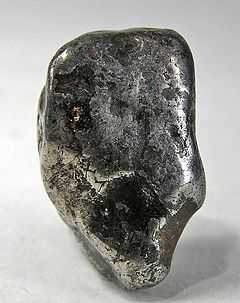Awaruite
| Awaruite | |
|---|---|
|
Awaruite pebble from Josephine County, Oregon, USA | |
| General | |
| Category | Native element mineral |
| Formula (repeating unit) | Ni2Fe to Ni3Fe |
| Strunz classification | 01.AE.20 Metals and intermetallic alloys |
| Dana classification | 01.01.11.04 Native elements: iron - nickel group |
| Identification | |
| Color | Silver-white to grayish white |
| Crystal habit | Massive; as pebbles, grains and flakes; rarely as crystals; as rims or regular intergrowths with kamacite in meteorites |
| Crystal system | Cubic Hexoctahedral H-M Symbol (4/m32/m) Space Group: P m3m |
| Tenacity | Malleable and flexible |
| Mohs scale hardness | 5.5 -6 |
| Luster | Metallic |
| Diaphaneity | Opaque |
| Specific gravity | 7.8–8.65 |
| Other characteristics | Strongly magnetic |
| References | [1][2][3] |
Awaruite is a naturally occurring alloy of nickel and iron with a composition from Ni2Fe to Ni3Fe.
Awaruite occurs in river placer deposits derived from serpentinized peridotites and ophiolites. It also occurs as a rare component of meteorites. It occurs in association with native gold and magnetite in placers; with copper, heazlewoodite, pentlandite, violarite, chromite, and millerite in peridotites; with kamacite, allabogdanite, schreibersite and graphite in meteorites.[1]
It was first described in 1885 for an occurrence along Gorge River, Awarua Bay South Island, New Zealand, its type locality.[1][2]
Awaruite is also known as josephinite in an occurrence in Josephine County, Oregon where it is found as placer nuggets in stream channels and masses in serpentinized portions of the Josephine peridotite. Some nuggets contain andradite garnet.[4]
References
- ↑ 1.0 1.1 1.2 http://rruff.geo.arizona.edu/doclib/hom/awaruite.pdf Handbook of Mineralogy
- ↑ 2.0 2.1 http://www.mindat.org/min-439.html Mindat.org
- ↑ http://www.webmineral.com/data/Awaruite.shtml Webmineral data
- ↑ John M. Bird and Maura S. Weathers, Origin of josephinite, Geochemical Journal, Vol. 13, pp. 41 to 55, 1979
